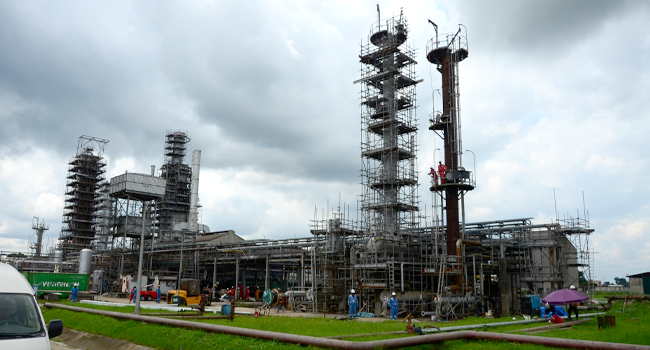The Port Harcourt Refining Company (PHRC) Ltd in Rivers State has commenced crude oil processing.
This is according to the Chief Corporate Communications Officer of the Nigerian National Petroluem Company Limited (NNPCL) Femi Soneye.
“Today marks a monumental achievement for Nigeria as the Port Harcourt Refinery officially commences crude oil processing. This groundbreaking milestone signifies a new era of energy independence and economic growth for our nation,” Soneye said on Tuesday.
“Hearty congratulations to President Bola Ahmed Tinubu, the NNPC Board, and the exceptional leadership of GCEO Mele Kyari for their unwavering commitment to this transformative project. Together, we are reshaping Nigeria’s energy future!”
Soneye said truck loading will also commence on Tuesday (today), adding that the NNPCL is “working tirelessly to bring the Warri Refinery back online soon”.
Tuesday’s development marks the end of multiple missed deadlines for the start of production at the refinery in Nigeria’s oil-rich Rivers State.
After taking office in August 2023, the Minister of State for Petroleum Resources (Oil), Heineken Lokpobiri, announced that the Port Harcourt refinery would commence operations in September, a timeline later postponed to December.
In March 2024, NNPCL Group Managing Director Mele Kyari indicated that production would begin in April.
“We are focused on delivering this rehabilitation project, our two other refineries, and all other investments towards revamping the nation’s refining capacity,” Kyari said in August when he inspected the rehabilitation work at the Port Harcourt Refining Company (PHRC) Ltd.
“We are hopeful that in 2024, this country will be a net exporter of petroleum products,” he said.
Three years ago, the Federal Government approved $1.5 billion (1.2 billion euros) to repair the plant, one of the country’s biggest refineries which was shut down in 2019.
Despite being one of the largest producers of crude oil, Nigeria has over the years relied on the importation of petroleum products owing to a lack of local refining capacity.
Nigeria swaps crude worth billions of dollars for petrol that it had subsidised for years to keep prices cheap for its domestic market. Fuel imports and subsidies caused a huge drain on foreign exchange when Nigeria was struggling with dwindling oil revenues and foreign currency shortages.
But in September 2024, the Dangote refinery began the production of petrol, months after it said the plant had started operation.
“Dangote Petroleum Refinery has commenced production of diesel and aviation fuel,” the group said. “This is a big day for Nigeria. We are delighted to have reached this significant milestone.”
With the coming onstream of the Port Harcourt refinery and the Dangote refinery already in production, Nigerians expect that these would cushion the impacts of the removal of fuel subsidy which hiked the cost of the commodity from around N200 to over N1,000 per litre.



